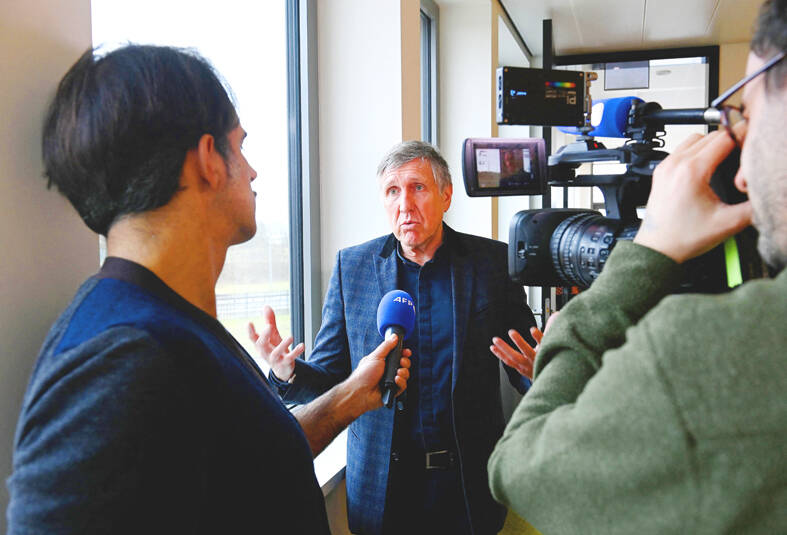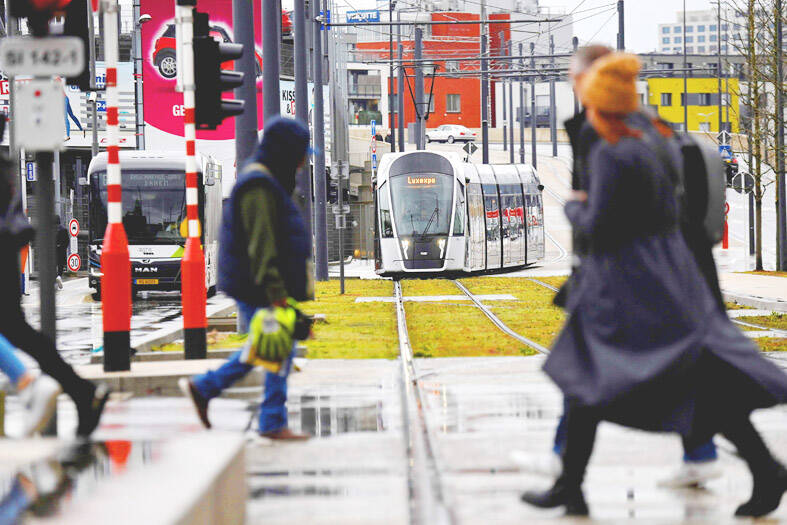Three years after Luxembourg declared all public transport free in a bid to clear its roads of jams and cut pollution, the car is still king of the congested grand duchy.
Traffic permitting, it is barely an hour’s drive from Weiswampach in the far north of Luxembourg near the German and Belgian borders to Dudelange in the south, next door to France.
The wealthy country of just 650,000 people appeared the perfect place for a bold experiment — making public transport on trains, trams and buses free nationwide.

Photo: AFP
However, Luxembourg, despite its lack of long-distance highways, has one of the highest rates of vehicle ownership in Europe, with only Poland exceeding its rate of 681 vehicles per 1,000 residents.
Cross-border workers bring in tens of thousands more vehicles every day as commuters head to jobs in Luxembourg, and long-distance drivers often pass by to fill their tanks in a country with low fuel taxes.
“I often say that Germans build cars and Luxembourgers buy them,” joked Luxembourgian Deputy Prime Minister Francois Bausch, who is in charge of mobility and public works.

Photo: AFP
Three years after ticket offices closed, there is no sign that Luxembourg has ditched vehicles for the tram, even if Bausch sees a thinning of traffic in the capital.
“Car culture is truly dominant and it remains pretty tricky to attract motorists onboard public transport,” said Merlin Gillard, a mobility expert at the Luxembourg Institute of Socio-Economic Research.
Luxembourg, along with the rest of the EU, is attempting to transform itself into a carbon neutral economy by adopting green technologies in transport, energy, factories and farms.
Luxembourgian Prime Minister Xavier Bettel’s coalition government invests 800 million euros (US$863 million) a year on public transportation.
The duchy has Europe’s highest-funded tram network per capita, costing 500 euros per person each year.
“It is the country that invests the most in Europe, but Luxembourg is coming from far behind,” Gillard said. “We’re making up for investment that has been very weak for years.”
In Luxembourg City, a modern financial services center built around an historic old town nestling in tight loops of the Alzette River, passengers appreciate the changes.
The central station is undergoing a thorough renovation, an ultra-modern funicular links the upper town to the riverside, and road lanes have been set aside for buses and trams.
Most of all, though, and uniquely in Europe: The network is free.
Edgar Bisenius, owner of a financial services business, said this is the prime consideration when choosing between a vehicle and the bus.
“It’s very positive for the environment,” he said.
French-language teacher Ben Dratwicki travels around the capital by bicycle on personal business, but takes the funicular and the train to get to his school 20km north of the city.
“Transport is a basic right for residents,” he said. “If we have the right to work, we should also have the right to be taken to work, without paying over the odds.”
However, Dratwicki seems to be in a minority across the country, where traffic jams of private vehicles still block major arteries during rush hour.
Part of the explanation might be the 220,000 cross-border workers, vital to Luxembourg’s economy, who arrive every day from neighboring countries to earn higher wages.
The trains and buses they could board in France, Belgium or Germany are not free until they cross into Luxembourg, and many daily workers remain wedded to their vehicles.
Bausch, of the Green Party, has a plan to help some of the French workers, who after all pay their income taxes in Luxembourg.
He aims to finance car parks on the French side of the border, and has promised that from 2027 or 2028 there would be a train from the French town of Thionville to Luxembourg every seven minutes.
However, experts like Gillard are skeptical, saying the problem is embedded in the underlying structure of Luxembourg’s economy.
French workers cannot afford rents or property in Luxembourg, but much of the cash they save by living at home is wasted on the busy and polluting commute to work, Gillard said.

The US government on Wednesday sanctioned more than two dozen companies in China, Turkey and the United Arab Emirates, including offshoots of a US chip firm, accusing the businesses of providing illicit support to Iran’s military or proxies. The US Department of Commerce included two subsidiaries of US-based chip distributor Arrow Electronics Inc (艾睿電子) on its so-called entity list published on the federal register for facilitating purchases by Iran’s proxies of US tech. Arrow spokesman John Hourigan said that the subsidiaries have been operating in full compliance with US export control regulations and his company is discussing with the US Bureau of

Taiwan’s foreign exchange reserves hit a record high at the end of last month, surpassing the US$600 billion mark for the first time, the central bank said yesterday. Last month, the country’s foreign exchange reserves rose US$5.51 billion from a month earlier to reach US$602.94 billion due to an increase in returns from the central bank’s portfolio management, the movement of other foreign currencies in the portfolio against the US dollar and the bank’s efforts to smooth the volatility of the New Taiwan dollar. Department of Foreign Exchange Director-General Eugene Tsai (蔡炯民)said a rate cut cycle launched by the US Federal Reserve

Businesses across the global semiconductor supply chain are bracing themselves for disruptions from an escalating trade war, after China imposed curbs on rare earth mineral exports and the US responded with additional tariffs and restrictions on software sales to the Asian nation. China’s restrictions, the most targeted move yet to limit supplies of rare earth materials, represent the first major attempt by Beijing to exercise long-arm jurisdiction over foreign companies to target the semiconductor industry, threatening to stall the chips powering the artificial intelligence (AI) boom. They prompted US President Donald Trump on Friday to announce that he would impose an additional

Taiwan’s rapidly aging population is fueling a sharp increase in homes occupied solely by elderly people, a trend that is reshaping the nation’s housing market and social fabric, real-estate brokers said yesterday. About 850,000 residences were occupied by elderly people in the first quarter, including 655,000 that housed only one resident, the Ministry of the Interior said. The figures have nearly doubled from a decade earlier, Great Home Realty Co (大家房屋) said, as people aged 65 and older now make up 20.8 percent of the population. “The so-called silver tsunami represents more than just a demographic shift — it could fundamentally redefine the